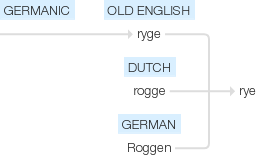Rye
Old English ryge, of Germanic origin; related to Dutch rogge and German Roggen .
wiktionary
From Middle English rie, reighe, from Old English ryġe, from Proto-West Germanic *rugi, from Proto-Germanic *rugiz, from Proto-Indo-European *Hrugʰís.
Germanic cognates include Dutch and West Frisian rogge, Low German Rogg, German Roggen, Old Norse rugr (Danish rug, Swedish råg); non-Germanic cognates include Russian рожь(rožʹ) and Latvian rudzi.
etymonline
rye (n.)
type of cereal plant widely cultivated in central and northern Europe, Old English ryge, from Proto-Germanic *ruig (source also of Old Saxon roggo, Old Norse rugr, Old Frisian rogga, Middle Dutch rogghe, Old High German rocko, German Roggen), related to or from Balto-Slavic words (such as Old Church Slavonic ruži, Russian rozh' "rye;" Lithuanian rugys "grain of rye," plural rugiai), from a European PIE root *wrughyo- "rye."
It makes the black bread of Germany and Russia; hence rye, short for rye-bread, by 1941 in U.S. restaurant jargon. The roast grains also were formerly used as a coffee substitute. It makes kvass in Russia, gin in Holland, and much whiskey in the U.S., hence the general meaning "whiskey" (made from rye), attested by 1835. Rye-bread "bread made from rye flour" is attested from mid-15c.
The rye of Exodus ix.32, etc. probably is spelt. In German peasant folklore the Roggenwolf ("rye-wolf") was a malignant spirit supposed to haunt rye-fields.
